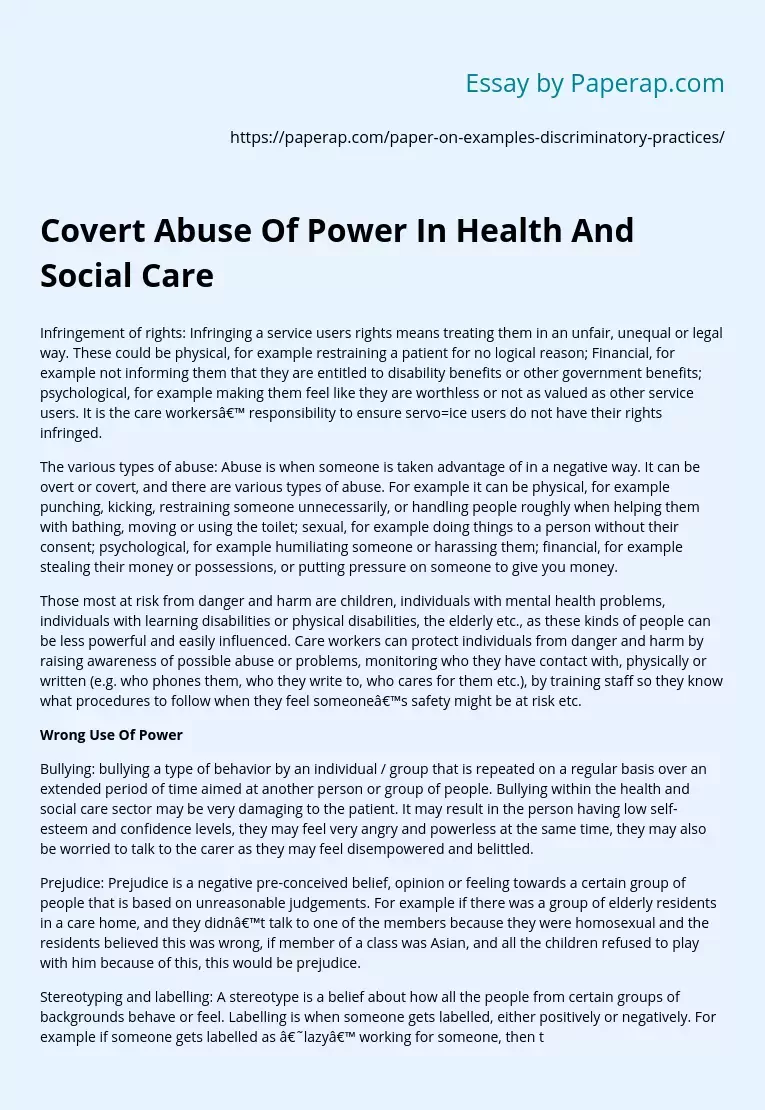Covert Abuse Of Power In Health And Social Care
Infringement of rights: Infringing a service users rights means treating them in an unfair, unequal or legal way. These could be physical, for example restraining a patient for no logical reason; Financial, for example not informing them that they are entitled to disability benefits or other government benefits; psychological, for example making them feel like they are worthless or not as valued as other service users. It is the care workers’ responsibility to ensure servo=ice users do not have their rights infringed.
The various types of abuse: Abuse is when someone is taken advantage of in a negative way. It can be overt or covert, and there are various types of abuse. For example it can be physical, for example punching, kicking, restraining someone unnecessarily, or handling people roughly when helping them with bathing, moving or using the toilet; sexual, for example doing things to a person without their consent; psychological, for example humiliating someone or harassing them; financial, for example stealing their money or possessions, or putting pressure on someone to give you money.
Those most at risk from danger and harm are children, individuals with mental health problems, individuals with learning disabilities or physical disabilities, the elderly etc., as these kinds of people can be less powerful and easily influenced. Care workers can protect individuals from danger and harm by raising awareness of possible abuse or problems, monitoring who they have contact with, physically or written (e.g. who phones them, who they write to, who cares for them etc.
), by training staff so they know what procedures to follow when they feel someone’s safety might be at risk etc.
Wrong Use Of Power
Bullying: bullying a type of behavior by an individual / group that is repeated on a regular basis over an extended period of time aimed at another person or group of people. Bullying within the health and social care sector may be very damaging to the patient. It may result in the person having low self-esteem and confidence levels, they may feel very angry and powerless at the same time, they may also be worried to talk to the carer as they may feel disempowered and belittled.
Prejudice: Prejudice is a negative pre-conceived belief, opinion or feeling towards a certain group of people that is based on unreasonable judgements. For example if there was a group of elderly residents in a care home, and they didn’t talk to one of the members because they were homosexual and the residents believed this was wrong, if member of a class was Asian, and all the children refused to play with him because of this, this would be prejudice.
Stereotyping and labelling: A stereotype is a belief about how all the people from certain groups of backgrounds behave or feel. Labelling is when someone gets labelled, either positively or negatively. For example if someone gets labelled as ‘lazy’ working for someone, then they might not get offered jobs and opportunities which could help them excel in their career.
Covert and overt abuse of power: Covert: covert means that something is hidden, in the case of power, it would mean that someone is concealing their abuse of power from the public/other service users/other care workers. Covert abuse of power can happen in any setting.
Overt: overt means that is it ‘out in the open’ or known by everyone. Overt abuse of power means that someone is abusing their power in front of other service users/care workers and isn’t trying to hide it. This can also happen in any setting.
For example, the manager of a care home making all the staff clean her office and tidy up after her every day would be an overt abuse of power. A covert abuse of power would be if the manager didn’t supply the residents with all of the complimentary things (free pyjamas, free snacks etc.) because she wanted to keep them all for herself in her office.
Covert Abuse Of Power In Health And Social Care. (2019, Dec 05). Retrieved from https://paperap.com/paper-on-examples-discriminatory-practices/

